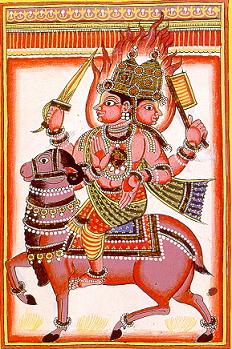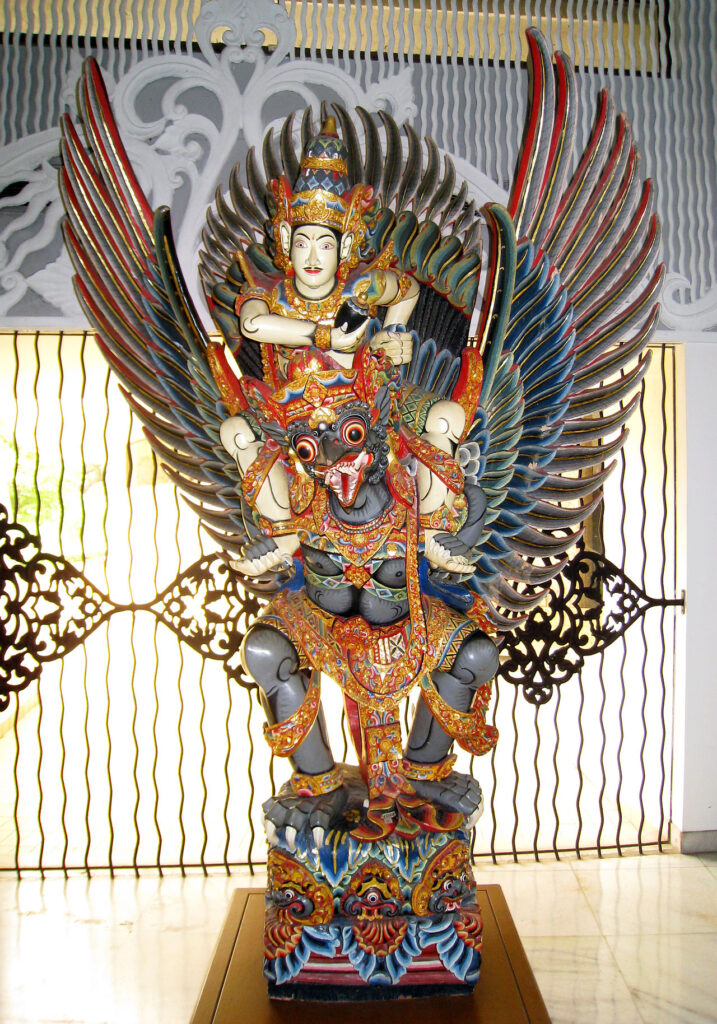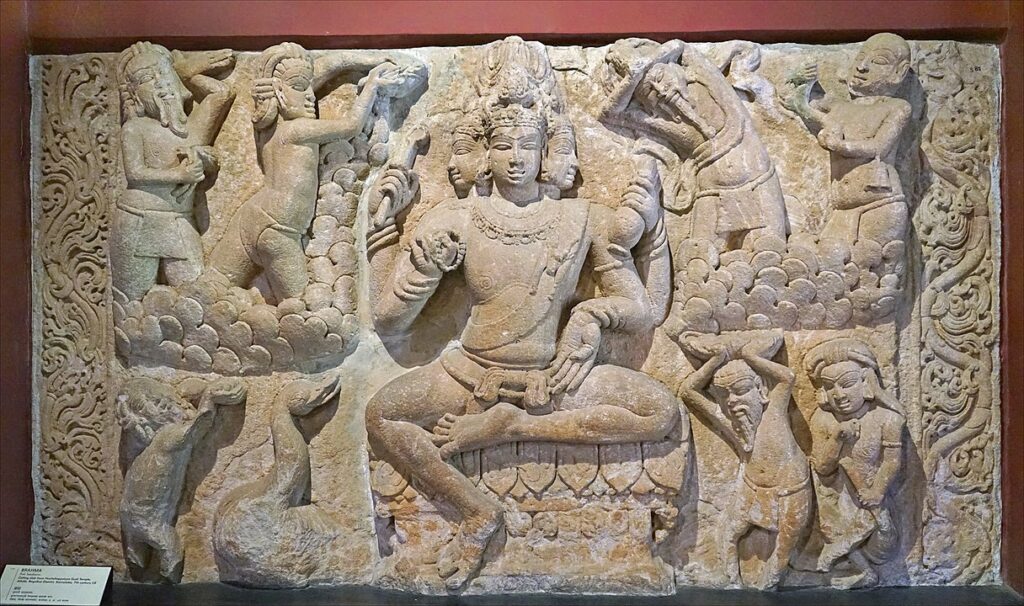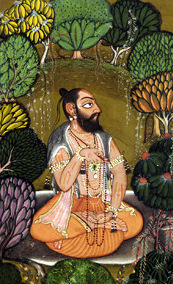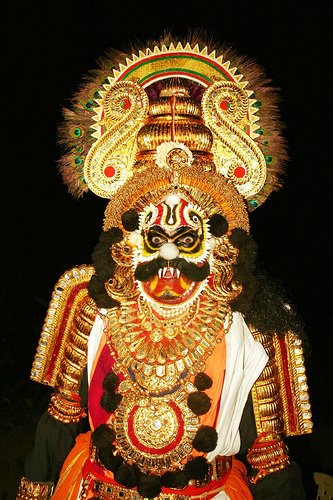Rishi Markandeya narrated one story after another to the Pandavas, Draupadi, Krishna, Satyabhama, and Narada. This time, Yudhistira asked why Agni went into the forest and how new types of Agni (fires) were created.
The rishi explained.
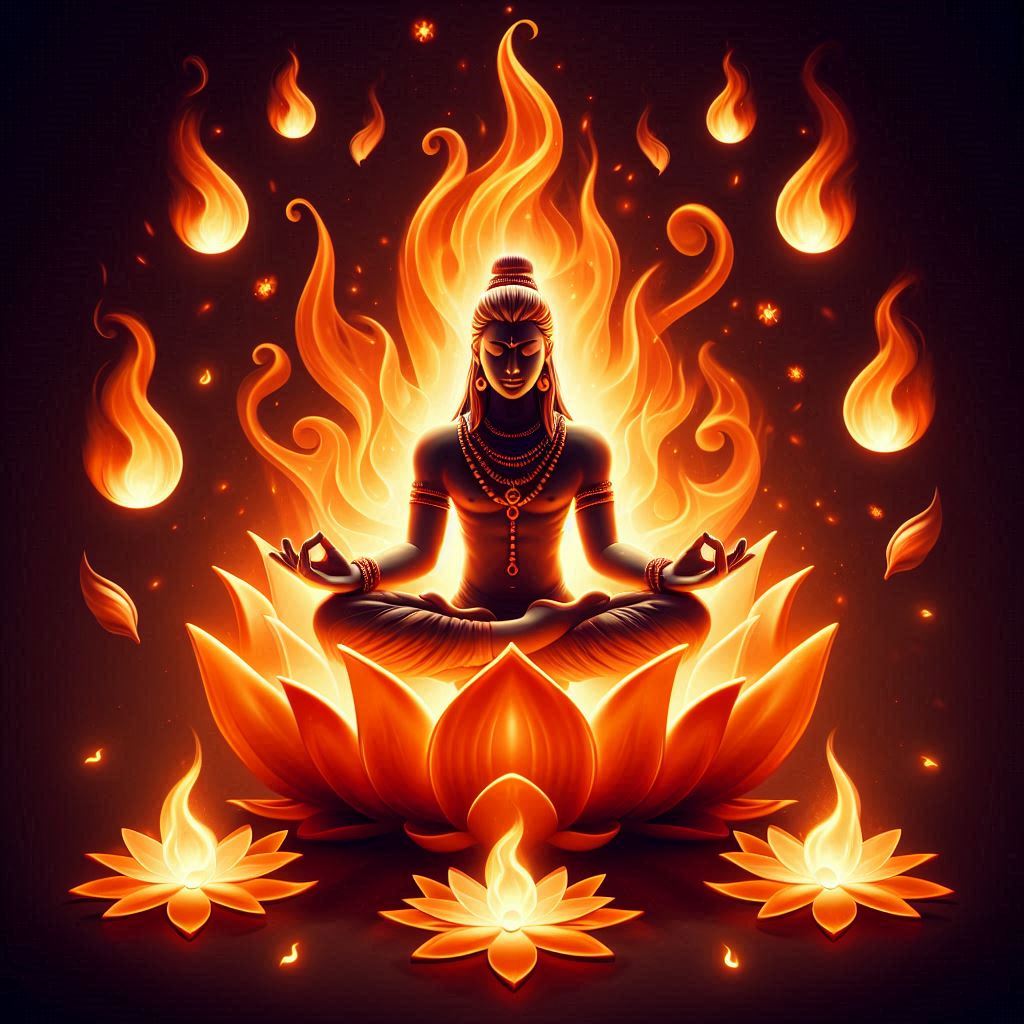
A long time ago, Agni was angry and stalked into a forest to perform austerities. With no Agni to offer oblations, everyone requested Rishi Angiras to become the second Agni to eliminate darkness. His energy was so fierce that it illuminated the world and reached Agni, who was in the forest. Agni thought Brahma created another Agni, so his services were no longer required. He went to Angiras and told him to continue being Agni.
However, Angiras replied that Agni was the first one created by Brahma, and he should get back to his previous position. Agni declined. He didn’t want to do that. It had been so many years that people now knew Angiras as their Agni. The real Agni was more than content to be a second Agni named Prajapatyaka.
Angiras told Agni to perform good deeds and obtain a place in heaven. He also asked Agni to have his first son through Angiras. Agni agreed. Angiras’s son Brihaspati became Agni’s son.
Then came many types of Agnis, each of them used for different purposes.
Angiras’s wife was Subha (he had more wives). Their offspring were Brihajjyoti, Brihatkirti, Brihadbrahma, Brihanmana, Brihanmantra, Brihadbhasa, and Brihaspati. His first daughter was Bhanumati, his second daughter was Raga, the third was Sinivali, the fourth was Archismati, and the fifth was Havismati, with her oblations. Angiras’s sixth daughter was Mahishmati, and the seventh daughter was Mahamati. She was radiant and was honored at great sacrifice. The eighth daughter was Kuhu (new moon), the one that cannot be divided.
Brihaspati and his wife Chandramasi gave birth to six sacred fires and a daughter. Their first son was Shyamu, a fire with many-hued flames. He was offered clarified butter (ghee) as oblations and got the first offering at horse sacrifices (Ashwamedha) and chaturmasya.
Shamyu and his wife Satya (daughter of Dharma) had Agni as their son, along with three daughters. Their first Agni son was Bharadwaja, and their second son was Bharata. The first share of offerings went to the older son, while the offerings of sacrifices performed at full moon went to Bharata.
Bharata had three wives, a son named Bharata, and a daughter named Bhavati. The son Bharata had a son named Prajapati Bharata.
Bharadwaja’s wife was Viraa, and their daughter was named Vira. Brahmins said that like Soma, Bharadwaja was worshipped with ghee. He was also called Rathaprabhu, Rathadhvana, and Kumbhareta when he received the second offering of Soma. Bharadwaja and another wife, Sarayu, had a son called Siddhi, who was celebrated in the ritual chant as the presiding deity.
The Nishchyavana fire praised the earth and was a symbol of creativity. It never lost luster, fame, or prosperity. His son is Vipapa, pure, untainted, and without sin, also called Satya.
The fire Nishkriti freed beings from lamentations and brought good fortune. His son was Svana, the creator of suffering.
The fire called Vishvajit illuminates the minds of the universe. His son, Vishvabhuj, was an internal fire that digested the food. He was a brahmachari and self-controlled in vows. Cooked food is offered as oblations to this fire.
The fire Vadava (also called Urdhvabhaj) would drink up all the water and rise high (the flames are bigger). Established in prana, the fire was worshipped by those who lived in houses facing the northward direction.
Svishtakrit was another fire, and his daughter was Manyati, the fire of anger in calm people. She was the essence of anger. Svaha is a cruel and terrible fire. There was another fire named Kama, the one with unmatched beauty.
The fire named Amogha destroyed enemies in a battle by being a bow and sitting on a chariot (and wearing a garland).
Uktha was another fire and the creator of speech, thus called Sakamashva.
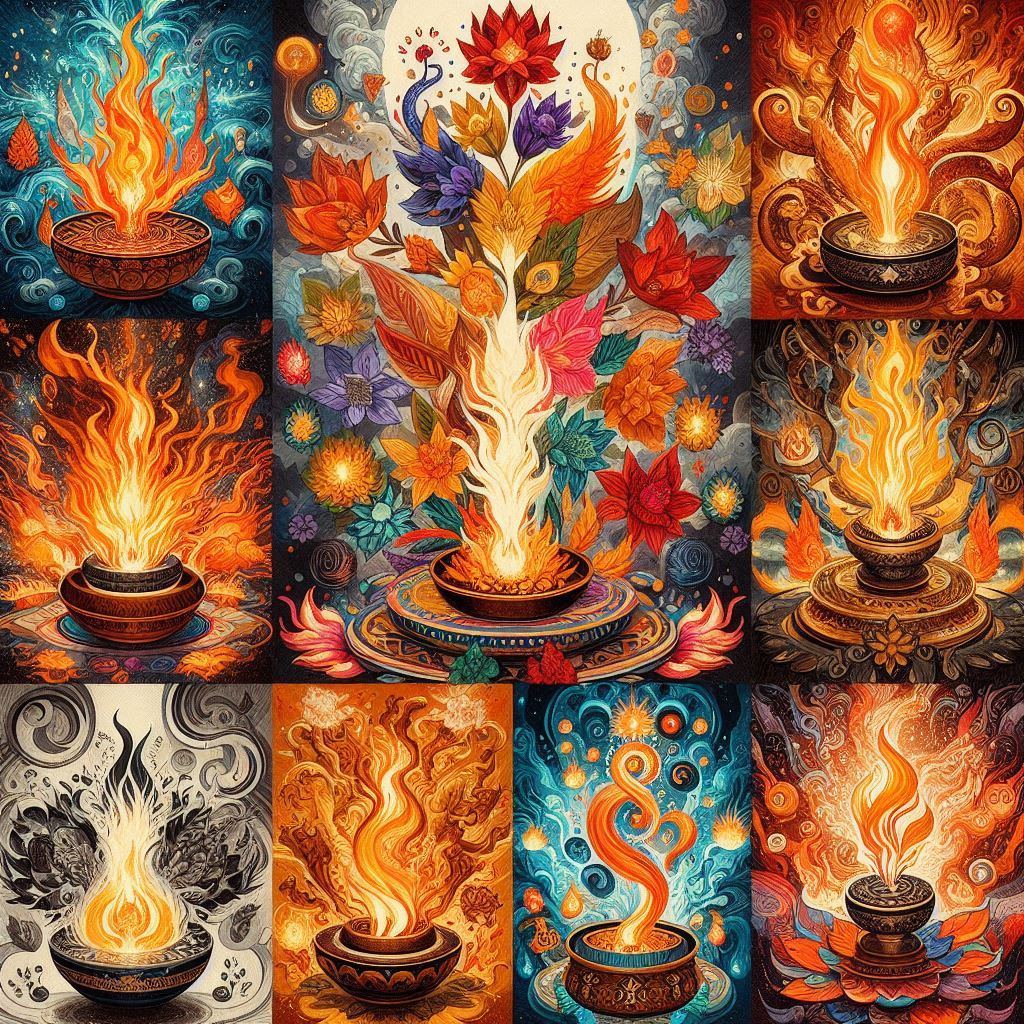
Kashyapa, Vasishtha, Prana’s son Prana, Agni Angiras, and Chyavana Trishuvarchaka performed severe austerities to obtain a son equal to Brahma. They created a fire with five colors. The son’s head was made of kindling fire, and his arms were like the sun. His feet were black, but his complexion was golden. This son is called the Panchajanya in the Vedas and was the origin of five lineages. After performing austerities for ten thousand years, he created various creatures and beings. He also created Brihat and Rathantara from his head and mouth, Shiva from his navel, Indra from his strength, Vayu and Agni from his life breath, the two accents from his arms, and the entire universe.
The five ancestors he created were – Pranidhi (Brihadurjas’ son), Brihattara (Kashyapa’s son), Bhanu (Angiras’s son), Saubhara (Varcha’s son), and Anudatta (Prana’s son). These five went on to create five lineages.
Additionally, he created the following –
- The sacrifice, the dawn, Abhima, Atibhima, and Bhimabalabala (15 gods, the obstructers of sacrifices)
- Sumitra, Mitravat, Mitrajna, Mitravardhana, and Mitradharma (5 gods of sacrifices)
- Surapravira, Vira, Sukesha, Suvarcha, and Surahanta (5 gods)
These three categories of gods were placed on the earth to cause obstructions in sacrifices. However, if the yagna fire was built skillfully, they could not go near it or cause trouble. They don’t steal the offerings if pacified with mantras.
Brihaduktha is another son learned in adhvaryus, and his offerings were meant for Mitravinda.
The fire named Bharata had severe restrictions. Pushtimati fire offered prosperity when satisfied with the offerings. The fire Shiva was always engaged in worshipping Shakti. He was called Shiva since he removed suffering and purified people/ things.
Tapas performed many austerities to have a son named Purandara. Ushma was another son and could be seen in all beings. Manu was another fire son who officiated Prajapati. Shambhu was a fire spoken about by the Brahmins learned in the Vedas. They also talk of Avasathya.
Tapas created two more sons – Urjaskara and Havyavahana, who shone like gold in their radiance.
The sun gave birth to asuras and terrible creatures when he was exhausted (nighttime).
Manu and Bhanu (also called Brihadbhanu), Tapas’s son, were created by Angiras.
Bhanu’s wives were Supraja, Brihadbhasa, and Somaja. They had six sons – Balada (the fire that gave strength to all beings), Manyumat (the terrible wrath in calm beings), Vishnu aka Dhritiman Angiras (offered oblations) during a full moon or new moon. Agrayana (got the first oblations along with Indra), Niragraha (for chaturmasya oblations), and another.
Manu’s wife, Nisha, gave birth to two Agnishomas, one daughter, and five other fires – Vaishvanara (received first oblations with Indra for chaturmasya sacrifices), Vishvapati (the lord of all beings), Svishtakrit (the supreme fire).
Hiranyakashipu’s daughter Rohini was married to Prajapati. Their children were –
- Samnihita (fire that resided in all bodies as the life breath)
- The fire whose path is black and white (smoke) bore oblations (based on anger and led the tainted to the untainted)
- (Rishi )Kapila (expounder of sankhya yoga)
- Agrani (first share of oblations to the deceased)
These four correct the defects in yagna fires.
- If the wind made the fires interact with each other, eight different rites had to be performed for the fire Suchi.
- If the fire of the south mixed with the other two, eight different rites had to be performed for the fire Viti.
- If the sacrificial fire mixed with the fire of conflagration, eight different rites had to be performed for the fire Dasyumat.
- If one heard the news that a living being (human or animal) died, eight different rites had to be performed for the fire Abhimat.
- A Brahmin who hadn’t rendered offerings to a fire for three nights should perform eight different rites to the northern fire.
- The one who awaited the observance of the full moon and new moon rituals had to perform eight different rites to the Pathikrit fire.
- If the fire of who was expecting touched the agnihotra fire, eight different rites had to be performed for the Agimta fire.

Saha Apa had a wife named Mudita. He was the lord of bhuh and bhuvah and had a fire son who was the lord of all beings. This fire (termed garhapatya) always circulated and was worshipped at sacrifices. He was also known as Apamgarbha and was the lord of bhuh, bhuva,h, and mahah. His son was Bharata, the fire who consumed dead bodies. Niyata/ Kratu was the best fire at agnishtoma sacrifices (and compared to Bharata).
Seeing Niyata, Agni went to hide in the ocean. The gods searched for him everywhere but couldn’t find him. Agni met Angiras and asked him to continue being the new Agni since he was too weak. He went into hiding again, but the fish revealed his location. An angry Agni cursed them to become food for others. The gods tried to convince Agni to return, but he refused. In fact, he gave up his body and entered the earth. Inside the earth, he interacted with various elements to create metals, minerals, etc. He created energy and fragrances from his mouth, the devadarus (Deodar Cedar Trees) from his bones, crystals from his phlegm, emeralds from his bile, black iron from his liver, mica from nails, and coral from arteries.
Agni continued to be immersed in austerities despite the lack ofa body. His fire flourished again and grew radiant. However, seeing the rishis, he was frightened again and got back to hide in the ocean. The universe and the gods were afraid of this pattern and sought help from Angiras (also called Atharva). He created the world and churned the ocean. He restored Agni to his earlier position and made him accept all oblations. Atharva then travelled to many countries and created sacrificial hearths in different locations. The following rivers became the sacrificial hearths established by him –
Sindhu, Devika, Sarasvati, Ganga, Shatakumba, Sarayu, Gandaki, Charmanvati, Mahi, Medhya, Medhatithi, Tamravati, Vetravati, Koushiki, Tamasa, Narmada, Godavari, Venna, Praveni, Bhima, Medratha, Bharati, Suprayoga, Kaveri, Murmura, Krishna, Krishnavenna, Kapila, and Shona.
Adbutha and his wife Priya had a son named Viduratha. The soma rites equal the number of fires mentioned by Rishi Markandeya. All of them were born in Atri’s lineage and the offspring of Brahma (his mind-born children). Atri created his own body.
Despite the various number of fires mentioned, these were all the same. There was only one illustrious fire, the one generated from Angrias’s body in many forms.

